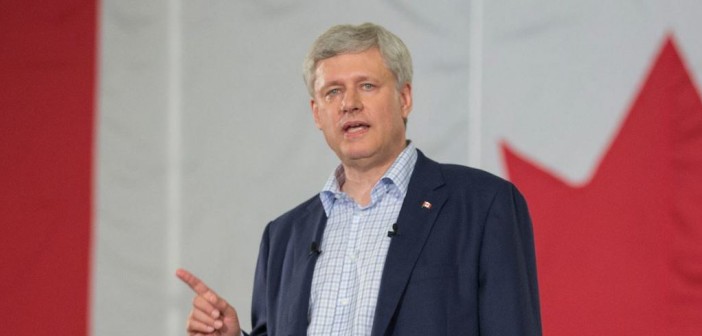Nearly a decade after he became prime minister, Stephen Harper has resigned as party leader following a decisive defeat by Justin Trudeau’s Liberals.
In a statement sent out late on Monday evening, Conservative Party President John Walsh said he had spoken to Harper, “and he has instructed me to reach out to the newly elected parliamentary caucus to appoint an Interim Leader and to the National Council to implement the leadership selection process.”
In a concession speech to supporters in Calgary, Harper did not mention his resignation as leader, but said he accepted the defeat by Liberal Leader Justin Trudeau “without hesitation.”
“It has been an unbelievable honour to serve as your prime minister,” Harper told the crowd shortly before 10 p.m. local time.
“While tonight’s result is certainly not the one we had hoped for,” he added, “the people are never wrong.”
Since the Conservative prime minister came into power in 2006, his government has been harshly criticized for gutting federal science libraries, speeding massive omnibus bills through parliament, and making legendary cuts to support for veterans.
In the lead-up to the 2015 federal election, Conservative finance minister Joe Oliver has been scrutinized for his expensive travels. In the last nine years, the federal government has also come under fire for partisan promotion, and a number of odd investments. In no particular order, here is a list of nine strange things on which the Harper government has spent taxpayer dollars.
1. The fake lake
The Harper government has long been in hot water for building a $2-million tourism pavilion at the 2010 G8/G20 summit media centre in Toronto, which infamously included a ‘fake lake’ that simulates Ontario’s cottage country. The Conservatives spent a record $1.1 billion hosting the events, including $160 million in hospitality, food, security, and infrastructure bills.
The expenditures were labelled “obscene,” “unprecedented,” and a “poor example” of government spending.
Then-Liberal leader Michael Ignatieff criticized the prime minister in the House of Commons: “Canadians wanted leadership, and all they got was a fake lake.”
2. The photo op
Peter MacKay, F-35 fighter jets, government photo op, stealth fights, Harper government.
Taxpayers fronted $47,000 for a 2010 Tory press conference during which then-Defense Minister Peter MacKay posed for a “hero shot” in a fake F-35 fighter jet built by manufacturer Lockheed Martin, which was brought in from Texas for the special event.
Calls for MacKay’s resignation have come in ever since for consistently low-balling the costs of the stealth fighters, which went from around $9 billion in 2010 to as much as $45 billion in 2012. He quit his job in May 2015, and the purchase of F-35s for Canada’s fleet has been a contentious political issue ever since.
3. Fighting sick mothers
Since 2012, the Conservative government has spent more than $1.3 million in legal fees trying to prevent new mothers who fell seriously ill during maternity leave from collecting disability benefits in addition to the employment insurance (EI) currently paid to new parents.
According to The Globe and Mail, two Calgary women launched a class action lawsuit three years ago seeking more than $450-million in compensation on behalf of thousands of new mothers who were denied EI disability benefits, or dissuaded from applying for them.
Liberal MP for Cape Breton-Canso Rodger Cuzner demanded an explanation from the prime minister this spring after breast cancer survivor and new mother Jennifer McCrea was refused EI sick benefits.
He also took a jab at the recent Senate expense scandal involving Mike Duffy and Nigel Wright: “The Prime Minister did nothing for her,” he said. “Why didn’t the Prime Minister go to his chief of staff and say, “Nigel, could you fix this for me? Could you make it ‘good to go’? Cause he has done that before.”
4. Big-ticket beverages
Former International Cooperation Minister Bev Oda and current Finance Minister Joe Oliver seem to share a taste for costly coolers, provided taxpayers are footing the bill. In 2011, Oda expensed a $16-glass of orange juice and a $1,995-stay in the swanky Savoy Hotel during a government trip to London, England, where she also hired a limousine to cart her around at a cost of nearly $1,000 per day.
In 2012, Oliver also expensed a $16-glass of scotch he drank at the rooftop restaurant of the Mammilla Hotel in Jerusalem. He later spent $5,593 on two one-way flights between Toronto and Calgary to hold roundtable meetings with oil, gas, steel and pipeline companies.
While Oda repaid more than $3,500 in expenses during her time in office (and eventually resigned), Oliver’s spokesman maintains that he followed all the government business travel rules.
5. The ad blitz
An estimated $750 million has been lifted from the public purse since 2006 to pay for government advertising, much of which has been labelled “partisan” by critics.
The ads — which have repeatedly run during expensive primetime viewing slots like NHL playoffs and the Oscars — have included $5.2 million promoting the Economic Action Plan and $24 million touting Canada-U.S. relations in Washington to increase support for the Keystone XL pipeline.
One 2013 ad by Employment and Social Development Canada even won a ‘Teddy Waste Award’ from the Canadian Taxpayers Federation for a $2.5-million blitz promoting the new Canada Jobs Grant months before the job training program was even available.
6. The non-split sausage
In 2012, Agriculture Canada gave $826,000 to Cardinal Meat Specialists Ltd. in Brampton, Ont. to help produce “a higher quality sausage that is more resistant to splitting or bursting while cooking.”
At the time, Parliamentary Secretary Pierre Lemieux (Glengarry-Prescott-Russell), said investing in a less explosive sausage was congruent with government objectives of improving “jobs, growth, and long-term prosperity.”
“This investment will support Cardinal Meat Specialists Ltd. in expanding their operations by developing a new product to meet growing market demands and increase their competitiveness,” he said in a press release.
7. Fashion for the Forces
Last year, taxpayers fronted a $4.5-million bill to buy brand new dress uniforms for Canadian soldiers and naval officers after the Harper government announced a historic return to World War II-era ranks and insignia.
The changes were mocked by many who wondered why the feds would revert to a system that went out of use in 1968 — “almost 20 years before the last soldier to die in Afghanistan was even born,” the CBC reported.
NDP defense critic Jack Harris criticized the government for wasteful spending on style while the needs of veterans and current military were not being met.
“This is certainly not an austerity measure,” he told CBC. “For what, to throw back to the Second World War? Why turn back the clock for something that is totally unnecessary? We had a perfectly adequate and relatively well-known set of insignia for the public.”
8. The superhero survey
In 2013, Defense Research and Development Canada (DRDC) spent nearly $14,000 on a survey that asked Canadians whether superheroes could fly, leap over skyscrapers, see through walls, become invisible and hear whispers from miles away.
The study was completed by Toronto researcher M. Afzal Upal, and designed to help the Canadian Forces “win the hearts and minds” of local populations when deployed overseas.
“The Canadian Armed Forces needs to be able to inform and reassure local populations,” DRDC spokeswoman Myriam Bower told the Toronto Star in an email when asked why the research was undertaken during other defense budget cuts. She then added that the study was offered in a competitive process, “to ensure best value for taxpayers.”
9. The New York Yankees
Taxpayers forked out at least $45,000 for Prime Minister Stephen Harper’s 2011 Labor Day weekend trip to Manhattan, which included pricey New York Yankees tickets and a Broadway show. Harper was accompanied by his daughter Rachel, four staffers, and guests. Documents obtained by the CBC under Access to Information revealed a portion of the excursion’s costs — $34,633 for the use of the Challenger Jet and another $11,026 for the expenses of staff.
Spokesperson Julie Vaux told the CBC via email in 2012 that Harper had reimbursed the government for the flight, accommodation, and ticket costs of himself, his daughter and two guests, but did not disclose the dollar amount of the reimbursement. The Prime Minister’s Office (PMO) also didn’t offer an explanation about the role of the staffers on the trip.
Harper congratulated Trudeau, but also emphasized that his party had managed to elect a “strong Official Opposition.” The Conservatives were leading or elected in about 100 of Parliament’s 338 seats as he gave the speech.
It’s a far cry from his speech on Jan., 23, 2006, when he first rose to power.
As he prepared to take over after 13 years of Liberal reign, Harper said in his 2006 victory speech, “the result tonight signals a change of government, not a change of country.”
Three mandates later, including a strengthened minority during the 2008 financial crisis and a strong majority in 2011, many would disagree.
In a 2013 speech at his party’s convention in Calgary, Harper outlined some of the ways he believed his government had changed the country.
That 2013 speech was notable too for what it didn’t mention.
Harper avoided talking about climate change, after pulling out of the Kyoto Protocol in 2011.
He also ignored Aboriginal issues in the speech. That wasn’t surprising considering he cancelled Paul Martin’s $5-billion Kelowna Accord with Aboriginal peoples, and rejected a steady drumbeat demanding a national inquiry into missing and murdered Aboriginal women.
Harper was widely criticized during his tenure for eliminating the long-form census in 2010 and was accused of “muzzling” tax-payer funded scientists.
Harper rose to power on a promise to clean up Ottawa following the Liberal sponsorship scandal. His Federal Accountability Act did manage to limit union and corporate donations to political parties and set out rules for lobbying, but it was perhaps later overshadowed by his party’s own ethical scandals.
Most notable, perhaps, were the Conservative senators suspended for questionable expense claims, and the trial of Sen. Mike Duffy after Harper’s chief of staff Nigel Wright wrote a cheque to cover Duffy’s expenses.




